The Biden administration wants to remove medical debt completely from consumer credit reports, so the Consumer Financial Protection Bureau on Thursday outlined its proposed rules to keep unpaid medical bills from affecting patient’s credit scores.
One in 5 Americans have medical debt on their credit reports, according to the CFPB. Medical debt can lead to a debt spiral for some consumers and narrow their options for housing, loans and credit cards.
“We know credit scores determine whether a person can have economic health and wealth,” said Vice President Kamala Harris. “Credit scores determine whether a person can buy a home, whether they can buy a car, rent an apartment, or own a small business.”
More from Personal Finance:
IRS halts processing of a small business tax break amid ‘surge of questionable claims’
Average Social Security retirement benefit may grow by some $57 per month in 2024
Student loan borrowers at risk of scams as payments restart, says FTC
Medical debt is the most common debt in collection. The CFPB found that 58% of all third-party debt collection on consumer credit reports was for medical bills. The complexity of medical billing also makes it prone to errors. One study from the Medical Billing Advocates of America estimates up to 80% of medical bills have mistakes.
“These bills, even ones where the patient doesn’t owe anything further, can end up being reported on the patient’s credit report,” said Rohit Chopra, director of the CFPB, “and millions of people have spent millions of hours disputing these errors, often while dealing with serious illness.”
The CFPB outlined proposals to prohibit consumer reporting companies such as Equifax, TransUnion and Experian from including medical debts and collection information on consumer credit reports. As of July 2022, the companies no longer include medical debt in collection under $500 on credit reports. New rules would make that voluntary approach mandatory and extend to all medical debt.
The agency also wants to stop creditors from relying on medical bills for underwriting decisions, to ensure that only non-medical information is used when considering a borrowers’ loan application.
Vantage Score no longer uses medical debt or medical collection in its credit score calculation, and newer FICO score models put less weight on that information.
“If credit bureaus are pulling off much of this information already because it isn’t a good predictor of risk, why should creditors see your medical bills at all?” said Chopra. ”And if creditors don’t need to see your medical-billing history, why are we continuing to allow debt collectors to use credit reports to pressure people into paying questionable bills at all?”
The rulemaking process takes time; CFPB officials expect to issue a formal rule sometime next year.
“It is unfortunate that the CFPB and the White House are not considering the hosts of consequences that will result if medical providers are singled out in their billing compared to other professions or industries,” Scott Purcell, CEO of debt collection industry group ACA International, said in a statement.
Sen. Elizabeth Warren, D-Mass., a vocal supporter of the CFPB, praised the announcement Thursday.
“Vice President Harris is leading the fight to lower costs for hardworking Americans by addressing the burden of medical debt,” Warren said. “No one should have their credit ruined because of a medical emergency. By proposing to erase medical debt from credit reports, the CFPB is doing what the consumer agency does best: saving Americans money.”
— CNBC’s Chelsey Cox contributed to this story.
